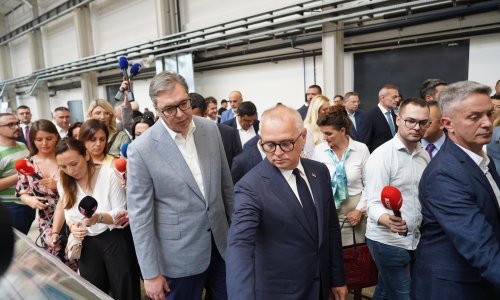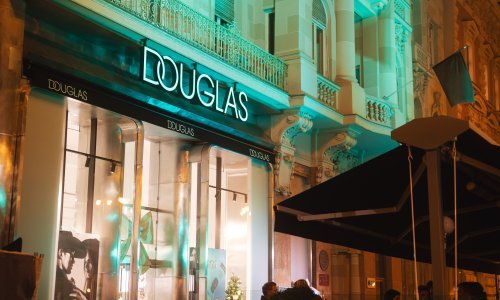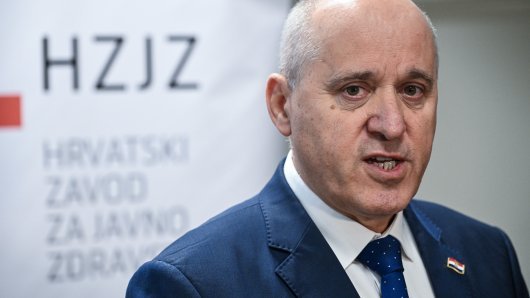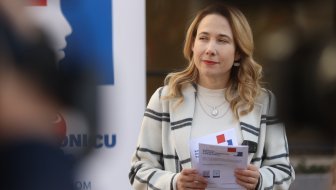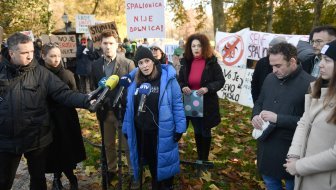Croatian citizens without permanent residence in Croatia will be allowed to vote only in Croatian diplomatic and consular missions abroad, and the diaspora will be entitled to three seats in the Croatian Parliament, leaders of the ruling Croatian Democratic Union (HDZ) and the strongest opposition Social Democratic Party (SDP) agreed in Zagreb on Friday.
This was the last remaining unresolved issue relating to constitutional changes proposed by the two parties, whose votes are needed for a two-thirds majority required for the adoption of constitutional amendments in Parliament.
The agreement was presented at a press conference by the president of the HDZ and Prime Minister, Jadranka Kosor, and SDP leader Zoran Milanovic.
The number of polling stations for out-of-country voting will thus be significantly reduced since Croatian citizens without permanent residence in Croatia at the last parliamentary election voted at as many as 265 polling stations, including 124 in Bosnia and Herzegovina.
In that country, out-of-country voting in Croatian elections will be organised exclusively at the Croatian Embassy in Sarajevo and at the Croatian consulates in Banja Luka, Mostar and Tuzla.
Kosor said that the agreement on Croatian citizens without permanent residence in Croatia electing three deputies at diplomatic and consular offices was in line with the interests of all parliamentary parties because the adoption of constitutional changes by the end of the current parliamentary sitting in July would enable the adoption of other legislation important for the completion of Croatia's EU entry talks and its admission to the EU.
She said that the agreement reached today was a result of debates and consultations that were neither simple nor short.
When asked how she expected the Croats in Bosnia-Herzegovina to respond to this decision, Kosor said she believed that they would be satisfied with the fact that they can elect three representatives to the Sabor.
"I believe that it is very much in the interests of the Croats in Bosnia and Herzegovina, as one of the three constituent peoples, to see Croatia complete its EU entry talks and become a member of the EU and as such to strongly support Bosnia and Herzegovina, which is what it has been doing so far," Kosor said.
SDP leader Milanovic said the agreement was a reasonable compromise solution that would bring order and remove everything that had caused mistrust in the last ten years, and that was a decent solution for the next 10-15 years and more.
When asked why he had accepted the provision saying that disapora MPs can be elected with far fewer votes than MPs elected in Croatia are expected to win, Milanovic said that MPs in Croatia, too, had been elected with more or less legitimacy when it comes to the number of votes.
He said that the SDP would insist on the Croats in Bosnia and Herzegovina being a partner to Croatia, adding that "the time of a humanitarian, charity attitude towards them is over."
Milanovic said that now there were no obstacles to finalising constitutional changes.
He added that the SDP still wanted to discuss whether the Constitution should include a ban on discrimination based on sexual orientation, which already exists in the law on the prevention of discrimination.
The SDP leader also called for removing the constitutional provision under which the Parliament regulates by law the Office of the President of the Republic, saying that the provision had never been honoured and was illogical.
He added that the SDP was open to talks on the matter and that the President of the Republic should also join in.
Kosor, on the other hand, said that the Parliament should nevertheless respect the Constitution and adopt a law on the Office of the President whose content should be approved by a group comprised of representatives of the government, the opposition and the Office of the President.
Banning discrimination based on sexual orientation is well regulated by the Act on the Prevention of Discrimination, Kosor said, adding, however, that this matter too could be further discussed.
President Ivo Josipovic welcomed the agreement, saying that it would not only allow the amendment of the Constitution but also the continuation of Croatia's EU integration.
Josipovic congratulated the party leaders on reaching the agreement, expressing hope that it would be effectively implemented.



















